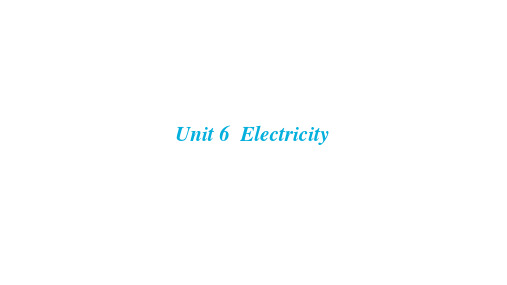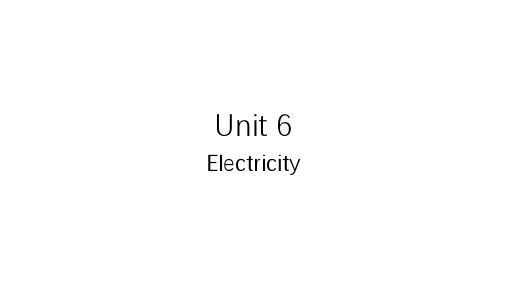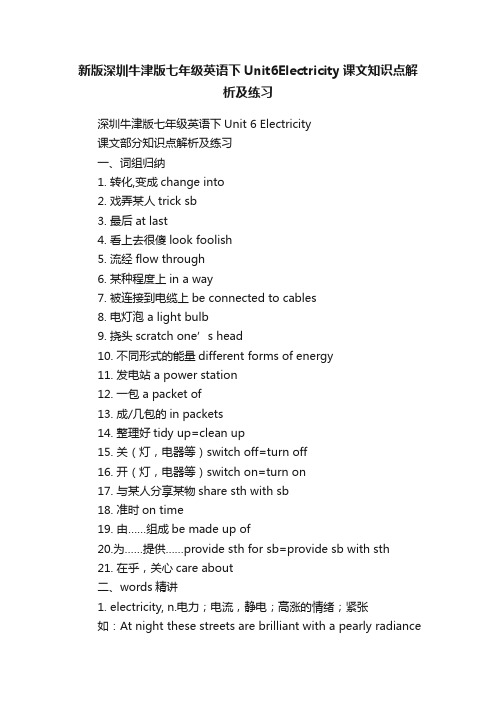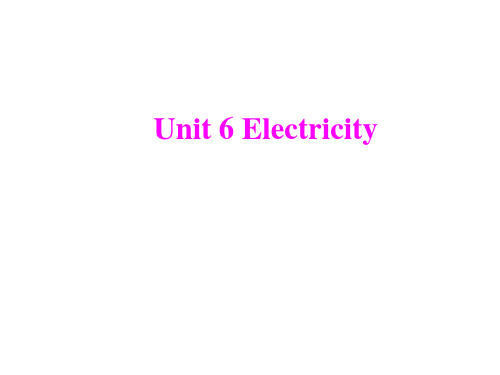牛津深圳版:2020年七年级下册 Unit 6 Electricity 语法专项训练(含答案)
新版深圳牛津七年级英语下Unit_6_Electricity_语法及练习 2

深圳牛津版七年级英语下Unit 6 Electricity语法及练习情态动词1、情态动词的定义: 情态动词是一种本身有一定的词义,表示说话人的情绪,态度或语气的动词,但不能单独作谓语, 只能和其他动词原形构成谓语。
情态动词无人称和数词的变化,后接动词原形。
We can be there on time tomorrow. 我们明天能按时去那儿。
______________________________我能知道你的名字吗?______________________________我们现在就开始吗?______________________________你必须遵守校规。
2、can的用法1) can “能,会”,表示某种能力。
过去式为:could.I can dance , he can swim.I can’t swim, he can’t dance.Can you swim? Yes, I can. /No, I can’t.Tom could swim at the age of 5.2) can 和be able to的区别: be able to 有人称数和时态的变化。
Be able to 可以用于过去、现在、将来等多种时态。
Tom was able to swim at the age of 5.I can come tomorrow .=I will be able to come tomorrow.3) can “可以”,表示请求,准许,同意。
Can you pass me the books? 你能给我递一下书吗?Could you help me, please? 请问,你能帮助我吗?could 可以表示委婉的语气。
回答时用can.Could I borrow you car?Of course you can. / Yes, you can.I’m afraid you can’t. /I’m sorry you can’t.3、may的用法1) may (might) 可以, 表示说话人同意,许可或请求对方许可。
2020-2021学年牛津深圳版英语七年级下册Unit 6 Electricity 知识点梳理课件

learn it every weekend.
—He is a hard-working boy.
A.mustn’t
B.may not
C.can’t
D.needn’t
II.根据句意,用 can, can’t, may, may not, must, mustn’t, needn’t
完成句子或对话。
Protecting natural resources means protecting our Earth. Let’s protect natural resources together.
六、语法归纳 情态动词的用法
情态动词本身有一定的词义,但也同助动词一样,需要与其 他词一起构成句子的谓语,另外情态动词没有人称和数的变化, 情态动词后必须跟动词原形。
Unit 6 Electricity
【单元知识点归纳】 一、重点单词 1.conversation:talk 谈话 n. 2.electricity 电 n. (electric adj.电的,用电的,发电的;electrical
adj. 有关电的,用电的。electrical 常与 equipment,appliance 等搭配)
5.The chemicals inside batteries produce electricity. 电池里的化学物质生产电。
6.Electricity makes our lives easier. 电让我们的生活变得更容易。
7.What do you know about electricity? How can we use them safely? 关于电你知道什么? 我们能怎么去安全地使用它们呢?
6.reply to:answer 回答 7.power station:a place to produce electricity 发电站 8.flow through:to move in one direction 流动 9.a moment later:after a while 一会儿以后 10.tidy up:make sth. neat and tidy 整理好
2020年牛津深圳版英语七年级下册Unit 6知识点总结讲解课件(PPT46张)

Home rules:
We must: 1.close the windows
Can 表示有能力做某事,“会”
May
观察
1. May/Can I use your mobile phone? 2. Yes, you may/can. No, you may not/can’t. 3. You may/can turn on the TV.
Conclusion: 1.情态动词may+动词原形 2.疑问句May…? 否定形式 may not. 3.情态动词may 表示请求、允许。在非正 式场合,can 也有此功能。
Negative
_s_e_n__te_n__ce__s_.
2、Can you give me a packet of electricity?
uncountable 电,电流 我们用电运行机器。 We use electricity to run machines. 我家的炉子不用电。 My cooker doesn’t need electricity.
Rice cooker •Keep the outside of the pot dry. •Do not switch the rice cooker on if the pot is empty.
Washing machine
•Do not put your hand in the washing machine when it is on. •Unplug it when you are not using it.
关 switch off 整理好 tidy up
空调 air conditioner
Key points
1、Does anyone want anything?
广东省深圳市文汇中学七年级英语下册《Unit6Electricity》指导教学书牛津版

广东省深圳市文汇中学七年级英语下册《Unit 6 Electricity》指导教学书牛津版I. 重点词组1. a moment later 一会儿 _后2. be connected ⋯t o 连接到;接通3. come from 来自4. a packet of一包5. be able to能;会6.look foolish看起来很愚蠢7. be like / look like看起来像8 .in a way在某种程度上9. all kinds of各种各样的10.change⋯int o 把⋯⋯转变成11. stay up late熬夜12. do more exercise/ take exercise做锻炼13. Share⋯ with 与⋯分享14.turn on / off=switch on/off打开/关上15. tidy up 整理好16. make sure确信17. care about关心18.all over the world全世界19. take the medicine服药20.power station发电站II .重点句型1.Sh e’ll look foolish。
2. You mustn’t say that, Benny.本尼,你不准这样说。
3.What do you know about electricity, Benny?本尼,你了解电吗?4.It is like water, in a way.在某种程度上,它像水一样。
5.Electricity comes into our flat through thin wires.电通过电线进入我们冢里。
6.They are con nected to a power station.电线被连接到发电站7.Here you are.给你III.词语解释与拓展1.【拓展】 foolish ,silly , stupid 的含义都是“愚蠢的;笨的”;注意它们的区别:(1)stupid意思是“笨”;指缺乏正常理解力;智力差的:反应迟钝的。
新版深圳牛津版七年级英语下Unit6Electricity课文知识点解析及练习

新版深圳牛津版七年级英语下Unit6Electricity课文知识点解析及练习深圳牛津版七年级英语下Unit 6 Electricity课文部分知识点解析及练习一、词组归纳1. 转化,变成change into2. 戏弄某人trick sb3. 最后at last4. 看上去很傻look foolish5. 流经flow through6. 某种程度上in a way7. 被连接到电缆上be connected to cables8. 电灯泡 a light bulb9. 挠头scratch one’s head10. 不同形式的能量different forms of energy11. 发电站 a power station12. 一包 a packet of13. 成/几包的in packets14. 整理好tidy up=clean up15. 关(灯,电器等)switch off=turn off16. 开(灯,电器等)switch on=turn on17. 与某人分享某物share sth with sb18. 准时on time19. 由……组成be made up of20.为……提供……provide sth for sb=provide sb with sth21. 在乎,关心care about二、words精讲1. electricity, n.电力;电流,静电;高涨的情绪;紧张如:At night these streets are brilliant with a pearly radianceof electricity.Electric adj. 电的;电动的;electrical adj. 有关电的;电气科学的2. foolish,adj.愚蠢的;鲁莽的;荒谬的,可笑的如:He was angry with himself for having made such a foolish mistake.Fool vi. 欺骗;开玩笑;戏弄n. 傻瓜;愚人;受骗者vt. 欺骗,愚弄adj. 傻的Art dealers fool a lot of people.艺术品经销商会愚弄许多人。
牛津深圳版七年级下Unit6 Electricity课件

Listen carefully the words after but. They usually introduce a different idea.
Write down the relevant (相关的) information quickly.
Presentation
√
学.科.网
Presentation
3. She’ll look foolish.
学.科.网
foolish 愚蠢的,笨的
He was sad for making such a foolish
mistake.
因为犯了一个很愚蠢的错,他感到
很难过。
Presentation
4. It flow through wires. flow 流动,流通 The melted snow flowed from the
The work is well done in a way.
从某种程度上说, 这工作做得不错。
Exercises
I. 单项选择. 1. — Can you tell me what electricity is like? — Surely, electricity is like water ______. It flows through a wire.
________ electricity
5. They’re connected to a power station.
(line 16) ______ wires
Presentation
D2. The pictures below shows electricity gets to Benny’s flat. Fill in theb lanks with the correct words from the box.
牛津译林英语(深圳沈阳)版七年级下册Unit6-Electricity-重点词汇短语句型讲解课件
electrical : _a_d . 有___关__电的____;
e.g.: The keyboard was connected to my computer.
【考题链接】
请打开电脑并连接因特网。
Pl__e_ase____t_u_r_n_o__n__th__e_c__o_m__
Words
12. A moment later, Daisy came back.
moment: n.___瞬__间;___片刻_____;
e.g.: Water, in a way, is people’s most important need. e.g.: In a way, he is right. in a way 可放句首,句中,句末
【拓展】
in many ways
在___很多___方__面
in some ways
___;
on one’s/the way to ...在___去…在_一__些的方___路_面__上
Words
4. Talk about safety rules at home.
rule: n.__规__则____;(可数名词) e.g.: Everyone must obey the rules.
【拓展】 obey the rule(s)
遵守规则 __ __ __ _____;
break the rule(s) 违__反__规__则_____;
Unit 6 Electricity-语法讲义 牛津深圳版英语七年级下册
1. 掌握本单元重点句型;2. 掌握情态动词的概念及用法语法1.情态动词can/can not , may /may not, must/must not 的基本用法。
unit6 Electricity 语法1.can的用法。
1)表能力We can do our homework by ourselves. 我们可以自己完成作业。
He can swim well. 他游泳很好。
I can play football but I can’t play the piano. 我会踢足球但是我不会弹钢琴。
2)表许可You can watch TV after supper. 晚饭后你可以看电视。
You can’t play basketball in the street. 你不能在街上打篮球。
3)表请求Can you help me with my math? 你能帮我学数学吗?Could you lend your book to me? 你能把你的书借给我吗?注意:could 是can的过去式,但是这里并不表示过去时,而是表示委婉语气。
拓展:can 和be able to的区别(1)情态动词can只有两种时态形式,现在式can和过去式could,而be able to有多种时态形式。
在一般过去时中都表示能够时,两者可以互换。
例如:Mary can play the piano. (一般现在时)玛丽会弹钢琴。
She could / was able to play the piano when she was five.(一般过去时)她五岁时就会弹琴。
She has been able to play it since she was five. (现在完成时)她自从五岁起就会弹琴了。
(2)用在过去时中,could经常表示能够做某事,事实上不一定去做,而was ⁄were able to则表示“过去设法做成了某事”。
牛津深圳初中七年级英语下册 Unit 6 Electricity Period 1 words课件
touch v.触摸;碰
keep in touch 保持联系 touching adj.动人的 touched adj.受感动的 touchable adj. 可触的 toucher n.触摸者
n electricity 电 cooker 厨灶;炉具 conversation 谈话 fridge 冰箱
adj foolish
a packet of in a way (be) connected to power station washing machine swith off tidy up air conditioner
electricity n.电
Water, food, and electricity are hard to get. The electricity is off.
fool n.傻瓜 v.愚弄 愚蠢的:foolish; stupid; silly 聪明的:clever; smart; bright; wise
wire n.电线
The headphones
have no wires.
wired a. 连线的 wireless a.无线的
connect v.(使)连接
The wires connect under the floor. connected a.连接的 connection n.连接 be connected to 与...相连
These wires are connected to cables under the street.
cable n.电缆
electric a.电动的, 电的 electrical a.用电的;电学的 electronic a.电子的 electrify v.使充电;使通电
牛津深圳7下Unit 6 Electricity语法讲解及练习
(三)语法讲解情态动词一、情态动词的定义情态动词是一类用于表示说话人的情绪,态度或语气的动词,但不能单独作谓语, 只能和其他动词原形构成谓语。
情态动词无人称和数词的变化,后接动词原形。
二、情态动词的特点1. 情态动词无人称和数的变化,2. 情态动词后面跟的动词需用原形,否定式构成是在情态动词后面加 "not"。
3. 个别情态动词有过去式, 过去式用来表达更客气, 委婉的语气, 时态性不强, 可用于过去,现在。
三、情态动词的用法1. can/could; can't/couldn't (否定)1) 表示能力, 意为“能、会”, 例如:如:I can speak a little English. (肯定句) I can't swim. (否定句)-- Can you ride a bike?(一般疑问句) -- Yes, I can. / No, I can't. (肯定、否定回答)2) 表示请求或允许,多用于口语中,意为“可以、能”等 , 如:You can go home now. (肯定句) You can't stop your car here. (否定句)-- Can I borrow your bike?(一般疑问句)-- Yes, you can. / No, you can't. (肯定/否定回答)3) 用于否定句、疑问句中,表示猜测、怀疑或不肯定, 如:Lucy can't be at home now, she went to the park just now.Lucy肯定现在不在家,她刚刚去了公园。
Where can it be? I can't find my football. 我的球有可能在哪里呢?我找不到。
◆◆【注意:】1) could 是can的过去式, 有两种用法, 一种表示过去式;一种用来表达更加客气, 委婉的语气, 时态性不强, 可用于过去,现在。
- 1、下载文档前请自行甄别文档内容的完整性,平台不提供额外的编辑、内容补充、找答案等附加服务。
- 2、"仅部分预览"的文档,不可在线预览部分如存在完整性等问题,可反馈申请退款(可完整预览的文档不适用该条件!)。
- 3、如文档侵犯您的权益,请联系客服反馈,我们会尽快为您处理(人工客服工作时间:9:00-18:30)。
七年级下册 Unit 6 Electricity语法专项训练(一)一、用 must, mustn't, may, may not, can, can’t填空1. __________ I come in?2. I __________ speak a little French.3. __________ I have a look at your pictures?4.The child __________ ride a bike. He falls over all the time.5. The red light is on. We __________ stop.6. __________ she finish it in three hours?7. I __________ drive a car, but I will lean to drive when I grow up.8. You __________ borrow three books at a time. But you __________ keep one for a week.9. The new law(法律) says drivers __________ rive after drinking wine.10. --- __________ I finish the work today?--- No, you needn’t.二、句子改错11. Tony's father mays go to the bank today.12. Tom is a singer. He can sings very well.13. Do you must sleep early at night?14. Can she speaks English very well?15. --- Must I finish reading this book tonight?--- No, you mustn't.三、阅读理解Electrical Appliances on Sale1. What day may be the first day of the electrical appliance sales?A. Monday.B. Tuesday.C. Wednesday.D. Thursday2. If a person wants a rice cooker, he may get one at a price of __________ off at most.A. 20%B. 25%C. 30%D. 35%3. Which of the following have the greatest special offer?A. Hair dryers.B. Computers.C. DVD players.D. Plasma TVs.4. One may get a fridge which is $800 at __________ if he goes to the Clive Peters Richmond Store on 16th, October.A. $800B. $640C.$600D.$5605. You can probably read this passage on a __________.A. novelB. text bookC. travel guideD. newspaper语法专项训练(二)一、单项选择1. This is just between you and me. You __________ tell anyone about this.A. mustn’tB. canC. mayD. must2. Don’t play with the knife, or you __________ get hurt.A. cannotB. mustC. mayD. may not3. Sorry, I __________ tell you where she is.A. mayB. may notC. canD. can’t4. You __________ go and see a doctor at once because you’ve got a fever.A. canB. mustC. mayD. would5. --- Are you going to Beijing by plane?--- It's fast, but expensive. So I'm not sure. I __________ take a train.A. shouldB. mustC. mayD. could6. --- You __________ smoke in the forest.--- Sorry, I won't do that again.A. canB. mayC. need n’tD. mustn't7. --- __________I finish the homework today?--- No, you needn't.A. MustB. CanC. ShouldD. May8. You __________ do it if you really don't want to.A. mustn'tB. can’tC. needn'tD. shouldn't9. --- Must I return the book tomorrow morning?--- No, you __________. You __________ keep it for three days.A. needn't; mustB. mustn’t; mustC. needn't; canD. mustn’t; may10. --- May I take this book out?--- No, you __________.A. shouldn'tB. may notC. needn'tD. aren’t二、语法选择If we try to think of the most important inventions in the 20th century, I think electricity __1__ the most important, in a way. It plays an important part __2__ the development of the modern world. It can affect everyone’s life in one way or __3__. When the electricity __4__ off, we call it a power cut. Can you imagine __5__ our lives will be like __6__ electricity? Almost everything __7__. Electricity appliances __8__ work; traffic lights are dead; many workers must stop __9__, and so on. Electricity is so important, __10__ it is also limited. What should we do? At least, we mustn't waste electricity.1. A. may be B. maybe C. may not be D. cannot be2. A. at B. on C. of D. in3. A. other B. another C. the other D. some4. A. go B. is going C. goes D. will go5. A. how B. when C. which D. what6. A. need B. with C. without D. having not7. A. stop B. stops C. will stop D. is stopping8. A. aren’t B. mustn’t C. don’t D. can’t9. A. working B. to work C. to working D. worked10. A. and B. but C. so D. or参考答案:语法专项训练(一)一、1. Can/ May2. can3. May/ Can4. can’t5. must6. Must/ Can/ May7. can’t8. can’t; can/may9. mustn’t10. Must二、11. Tony’s father may go to the bank today.12. Tom is a singer. He can sing very well.13. Must you sleep early at night?14. Can she speak English very well?15. --- Must I finish reading this book tonight?--- No, you needn’t.三、DCBCD语法专项训练(二)一、1-5 ACDBC 6-10 DACCB二、1-5 ADBCD 6-10 CCDAB。
